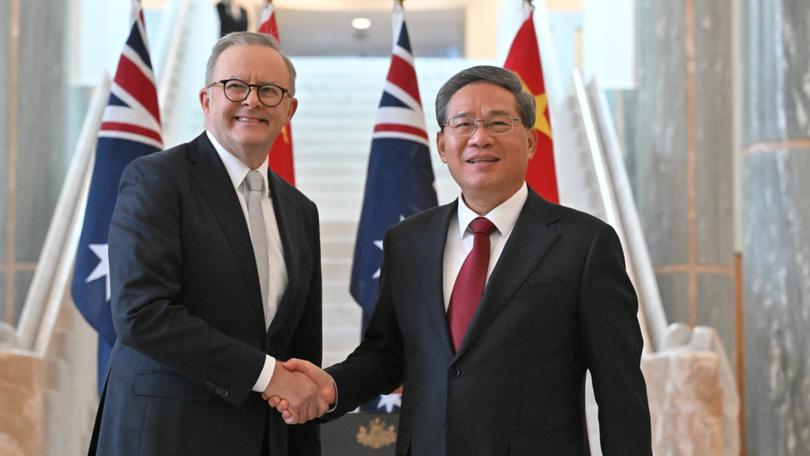Australian Prime Minister Anthony Albanese urged to muscle up to China ahead of season of global talks

Prime Minister Anthony Albanese is being urged to adopt a more hard-line approach to China’s military aggression ahead of possible face-to-face talks with Beijing’s second-in-charge.
Mr Albanese is tipped to meet Chinese Premier Li Qiang on the sidelines of the Association of Southeast Asian Nations (ASEAN) summit in Laos this week.
ASEAN marks the start of the annual “summit season” for Mr Albanese, who will travel to Samoa, Peru and Brazil for international talks in the next seven weeks.
Sign up to The Nightly's newsletters.
Get the first look at the digital newspaper, curated daily stories and breaking headlines delivered to your inbox.
By continuing you agree to our Terms and Privacy Policy.Mr Albanese hosted Premier Li in Australia in June and speculation is growing the pair will meet again as politicians and diplomatic heavyweights from the US, China, Japan, South Korea and Canada join Southeast Asian leaders in the Laos capital Vientiane.
China - like Australia - is not an ASEAN member but its presence will loom large over the summit as Beijing’s rivalry with Washington and actions in the South China Sea divides the region.
The Federal Government was alarmed after China last month launched an intercontinental ballistic missile into the Pacific Ocean, crossing the airspace of several Pacific nations.
Beijing played down the rare test-fire as a “routine” training exercise but Defence Minister Richard Marles said the launch was concerning and Australia wanted answers on China’s motivations.
Mr Albanese response to previous Chinese military incidents have been described as “weak” by the federal Opposition, who have demanded the Prime Minister raise Australia’s grievances directly with President Xi Jinping.
Speaking with The West ahead of the summit, Australian Strategic Policy Institute senior analyst Malcom Davis said Mr Albanese needed to be more forceful in holding Beijing accountable.
However, Dr Davis doubted that would happen in Laos, predicting Mr Albanese would strike a diplomatic tone as the Federal Government continues efforts to stabilise relations with its largest trading partner.
“Chinese behaviour in general, in terms of its willingness to behave provocatively and challenge existing legal norms and so forth … I think it probably is something that should be raised,” he said.
“(But) I think he (Mr Albanese) will softball it. I think he won’t rock the boat.
“He’ll make some bland statement about sort of maintaining the International Law of the Sea and observing international norms and rules.
“But he won’t sort of disrupt things too much trying to take China on.”
Beijing’s ban on rock lobster imports, the plight of imprisoned Australian writer Yang Hengjun and China’s stimulus package to revive its flagging property market could also be discussed if the rumoured talks go ahead.
Foreign policy experts expect the most sensitive and contentious issue at ASEAN – a solution to the conflict in Myanmar – will remain unresolved at a summit not expected to deliver ground-breaking outcomes.
Mr Albanese will also participate in the East Asia Summit, which brings together 18 countries including the US, Russia, India, Japan and South Korea.
“We are committed to working with our partners to pursue a peaceful, stable and prosperous region with ASEAN at the centre,” Mr Albanese said.
“We are also acting to grasp economic opportunities in a region of incredible vitality and promise. Trade creates jobs for our nation and helps build our Future Made in Australia agenda.”
The summit will present Mr Albanese with a chance to rub shoulders with several new world leaders, including Japanese prime minister Shigeru Ishiba and Thailand’s 37-year-old leader Paetongtarn Shinawatra.
With the US election under a month away, Secretary of State Anthony Blinken will represent the Biden administration at the Laos talks.
